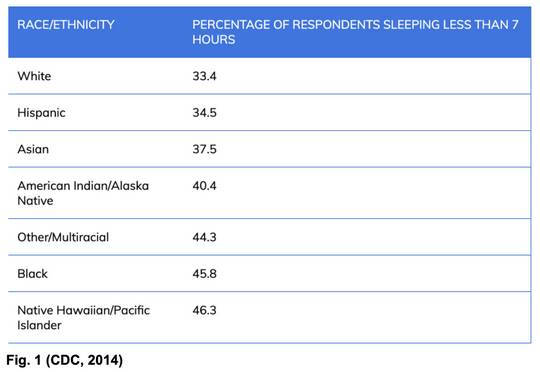Blog
Permanent link for The Racial Sleep Gap on March 18, 2021
I can never sleep before the first day of school. The night before my first day of 6th grade, I remember tossing and turning; the nerves and stress about the day ahead take over any exhaustion in my body. This happens to me every year and most of us have been there. But for many, it's not just the night before the first day of school or a big test, it's every night.
People of color are less likely to get 7 or more hours of sleep due to several racist factors. This creates a gap, or inequality, in sleep. Sometimes, in order to truly see the seriousness of this issue, it helps to see a visual (see Fig. 1). The CDC conducted a survey where they asked 444,306 American adults about their sleep patterns. The results are alarming; 34.5-46% of non- white adults were getting less than 7 hours of sleep per night with higher percentages of those that identify as Black or Native Hawaiian/Pacific Islander.
Race and Sleep: The Facts
To put it plainly, white people tend to get more (and better)
sleep than people of color. The gap is increased even further between
the wealthy and the poor. This gap is due to race, income, and status.
These factors intersect
easily and cause an enormous amount of stress, which ultimately
affects sleep, health, and overall well-being.
Place of residence, work schedule, and job strain, amongst other factors, play the biggest roles in the racial sleep gap.
- Place of Residence: In a study of around 33,000 participants, researchers found a direct correlation between sleep loss of African American and Hispanic people who live in inner-city areas compared to people who live in non-urban areas.
- Work strain: Due to discrimination in the workplacework place, African American and Latinx Americans are more likely to work unconventional hours and are about three times more likely to experience job related stress. Non-white people have to work harder, smarter, and faster to get to the same point as a white person. This is an exhausting, everyday battle that decreases healthy sleep patterns and not only increases the sleep gap, but contributes to many other health issues.
- Financial stress: People of color are less likely to be considered for higher level jobs due to discrimination in the workplace, which keeps them in lower income brackets. When most of the monthly income is spent on food, shelter, and water, other necessities get put on the back burner For example, healthy, organic foods tend to be more expensive or not available in certain areas. If a person has a low income and/or lives somewhere with less access to nutritious foods, it is much harder to find wholesome options. This can cause increased health problems including obesity, diabetes, and heart disease. Additionally, working two jobs may be a necessity for those in lower income brackets, leading to working more hours, increased stress, and inevitably less sleep
- Unequal Access to and Quality of Medical Care: Disparities in access to care have a broad effect on health outcomes for minority groups. For example, conditions like sleep apnea may be less likely to be diagnosed or effectively treated, or people may be less likely to discuss sleeping problems with a doctor.
Why is Sleep Important?
Sleep is important because it allows the body and mind to repair
and prepare for another day. Sleep allows the brain to function
correctly, helps the body fight diseases, and is an important part of
keeping your heart healthy.
There is a direct link between long-term sleep deprivation and health problems. As fellow WIT peer educator, Stella, notes in her recent blog post, “a poor sleep schedule can have very real, negative effects on people. Physically, you are at risk of a weakened immunity, weight gain, and heart-related problems such as high blood pressure and stroke. Maybe not so obvious, poor sleep is strongly linked to many mental disorders. It can impair your abilities to make decisions, cope with stress or change, and control emotions. These effects wreaked havoc on my life, and I didn’t even realize it was happening for so long!”
Lack of sleep targets your central nervous system, immune system, respiratory system, digestive system, cardiovascular system, and endocrine (hormone) system. When these body systems are out of tune, many serious health problems can occur, including:
- Memory and concentration issues
- Mood changes
- Weakened immune system
- High blood pressure
- Diabetes
- Obesity
- Low sex drive
- Heart disease
People of color experience these health problems at higher rates already, and they tend to experience even less sleep because of these health issues.
Wake Up and Smell The Racism
Sleep is so important. It re-charges us, mends us, and gives us a
much needed break from the craziness in our lives. While all humans
deserve a good night's sleep, not everyone gets the chance with the
inequalities that exist. The racial
sleep gap is a public health issue, and the United States needs
to do more to close it.
Understanding individual privilege and educating yourself on inequality, in all areas, is the first step. If you have the privilege of sleeping well each night, you can use your waking hours to raise awareness for sleep inequality. But how can you do this? By having impactful conversations with others who may not know or understand what the sleep gap is, supporting businesses owned and products made by people of color, and/or doing more research on inequality in America. Next time your head hits the pillow, you may think about things much differently.
By: Annie Seeber, WIT Peer Educator
Categories:
Sleep
Posted
on
Permanent link for The Racial Sleep Gap on March 18, 2021.


